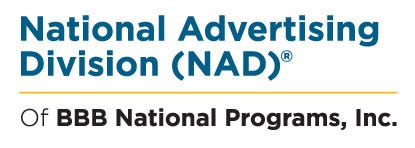NAD to keep monitoring supplement ads after CRN pact ends
The CRN/NAD program, which has closed more than 360 cases and been lauded as an important self-regulatory initiative in the dietary supplement industry, will end on July 1, 2020.
The Council for Responsible Nutrition (CRN) and National Advertising Division (NAD) are concluding a longstanding program that government has lauded as an important self-regulatory initiative to help foster the truthful advertising of dietary supplements.
The CRN/NAD program, which has closed more than 360 cases, will end on July 1, 2020, according to a joint news release from the organizations.
Kat Dunnigan, a senior attorney with NAD, a division of BBB National Programs, expressed gratitude to CRN and described the program as a “great success” that has informed industry about the requirement to support their advertising claims.
She said companies have provided more evidence for their claims in recent years versus the early days of the program in which NAD would often explain the concept of substantiation and relevant standards.
“The responsible dietary supplement industry recognizes the role truthful and accurate advertising plays in leveling the playing field for honest advertisers and in providing consumers with accurate information about products they rely on to improve their health and wellness,” Megan Olsen, vice president and associate general counsel of CRN, said in the news release.
Through funds from industry, CRN and cy pres awards, the CRN Foundation has provided NAD grants totaling $3.5 million to fund the program since its 2006 launch, Olsen said in a separate emailed statement. (Cy pres awards constitute leftover, or residual, funds from the settlement of a class action lawsuit, and a court must approve such awards to be used for the indirect future benefit of the class).
“In addition to the funding commitment, during the last 15 years, CRN championed the program to consumers and policymakers, encouraged the supplement industry to become more proactive by protecting its consumers, promoted the decisions of more than 360 dietary supplement advertising cases, and pursued nearly 100 challenges of its own using the program,” she added. “Due to competing initiatives and resources, CRN and its members have made the decision to end this initiative.”

Dunnigan, who led the CRN program for the last eight years, emphasized NAD will continue to monitor dietary supplement ads and provide a forum for companies to challenge whether their competitors have substantiation for their advertising.
“NAD is not leaving the space,” she said in an interview. “We will be looking at dietary supplement claims, and we encourage other companies to bring their claims to us.”
With the program ending, Dunnigan suggested NAD may focus its resources on the “most impactful” advertising claims—those with the greatest “penetration into the market.”
CRN, Olsen said, would continue its “partnership with NAD and encourage responsible industry to file challenges against companies making egregious claims in the dietary supplement marketplace using the general NAD review process.”
Reaction from industry attorneys
Katie Bond, an attorney in Washington, D.C., who has responded to self-regulatory challenges before NAD on behalf of supplement companies, said she did not believe the end of the CRN/NAD program would have an enormous impact. Bond pointed out many other entities monitor dietary supplement ads, such as the Federal Trade Commission, state attorneys general, consumer watchdog groups and plaintiff’s attorneys.
The FTC, she pointed out, has consistently targeted dietary supplements. Agency officials “have a long history of being very tough with this industry … and there’s no sign of that changing,” said Bond, a partner with Amin Talati Wasserman LLP, in an interview.
John Villafranco, another Washington, D.C.-based lawyer who focuses on advertising law matters, said NAD would continue to accept referrals from CRN and consider initiating cases on its own.
“While it is unfortunate that CRN will no longer fund the initiative, I fully expect the NAD to continue to review dietary supplement advertising claims, given NAD’s expertise in this area and its commitment to promoting truthfulness and accuracy in the marketplace,” Villafranco, a partner with Kelley Drye & Warren LLP, said in an email.
Commending the CRN/NAD program, Bond said it has provided a unique opportunity for advertisers to hold competitors accountable for their advertising statements.
“In many other industries, there’s just not the same ability to go after your competitors in this quick fashion and to have an entity like the NAD that has got a lot of respect among regulators, the FTC in particular,” she said.
In the rare instances in which companies refuse to participate in an NAD investigation or abide by its final decision, NAD refers the case to the FTC. Such a referral could result in an FTC investigation, though Dunnigan said the agency encourages companies to work with NAD.
An FTC spokesman had no comment on the announcement that the CRN/NAD program was ending, but former FTC Chairwoman Edith Ramirez previously described the program in a statement as a “valuable complement to the FTC’s own enforcement efforts to eliminate fraud in this industry.”
About the Author
You May Also Like

